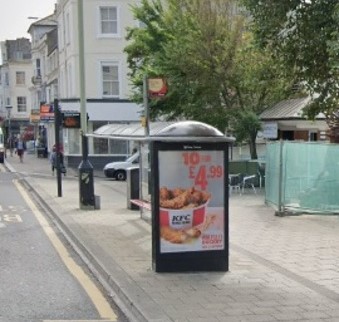A proposed ban on advertising fast food and energy drinks with high levels of fat, salt or sugar won the backing of councillors and NHS chiefs yesterday (Tuesday 8 November).
The ban would cover council land and buildings including hundreds of bus shelters where the advertising sales are currently managed by a contractor.
The final decision will be made by a committee of senior councillors on Thursday 1 December.
The proposal was debated yesterday by Brighton and Hove City Council’s Health and Wellbeing Board at a meeting at Hove Town Hall.
The board – made up of councillors, senior NHS officials and community representatives – heard that, in Brighton and Hove, one in three 11-year-olds leaves primary school overweight or obese.
The figure rises to one in two children in the more deprived parts of Brighton and Hove.
An audit of council-owned advertising sites found that 34 per cent of promotions were for food and drink containing high levels of fat, salt or sugar.
And currently, a survey is under way to review the advertising content along three bus routes to provide detailed information about the percentage of fast-food adverts.
Brighton and Hove would not be the first public body in the country ban fast food adverts, with Transport for London already having done so.
Councils in places such as London, Bristol and Barnsley have also introduced restrictions on adverts for food and drink containing high levels of fat, salt or sugar on transport systems and council-managed advertising spaces.
Public health consultant Katie Cuming, who works for Brighton and Hove City Council, said that the likes of McDonald’s had continued to advertise – but had changed the content of their adverts.
She said that an ad for a chocolate honeycomb frappuccino had been replaced by one for iced lattes instead.
Green councillor Sue Shanks, who chairs the Health and Wellbeing Board, said: “I initially thought it’d just stop the likes of Burger King advertising.
“What we’re talking about is the picture changing – so they still find something to advertise.”
Labour councillor Carmen Appich said: “I have an issue with large corporate chains who export their profits and don’t keep them in the city.
“I would love to restrict all advertising to local businesses only or to businesses that apply the gold food standards but that is not where we are and we rely on that income.”
The board heard that 223 bus shelters in Brighton and Hove carried advertising – 50 of them with digital screens.
Fast food advertising is already restricted within 100 metres of schools, youth clubs, council buildings, leisure centres and NHS buildings.
But bus shelter advertising brings in £425,000 a year which goes towards public transport subsidies.
If fast food advertising was banned and not replaced, 34 per cent of this revenue – or £145,000 – would be lost.
But, the board was told, when Transport for London introduced a ban, there was “no significant reduction” in advertising revenue.
The final decision on a ban will be taken by the council’s Policy and Resources Committee which is due to meet at Hove Town Hall at 4pm on Thursday 1 December.








